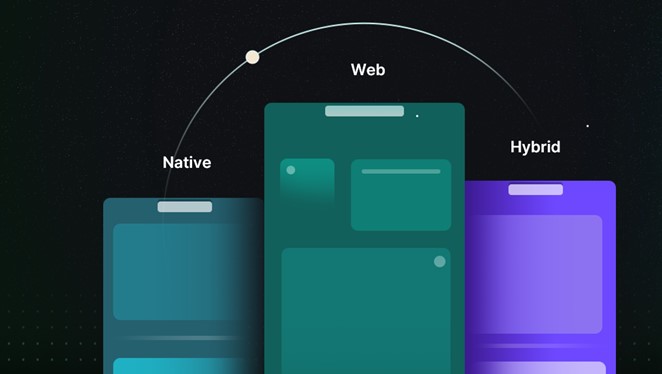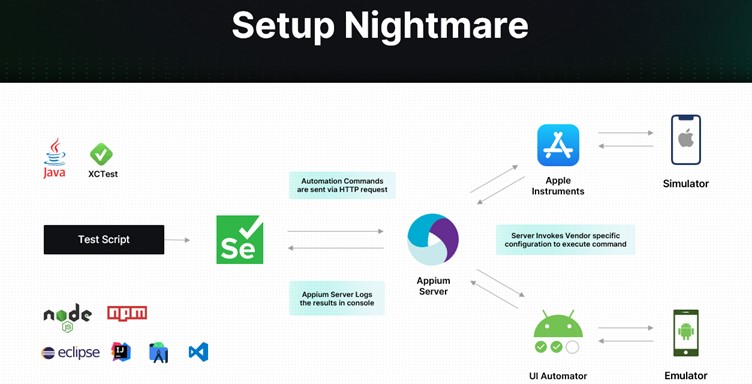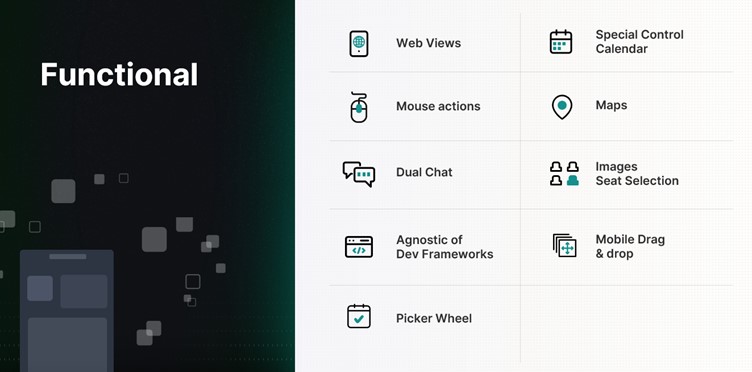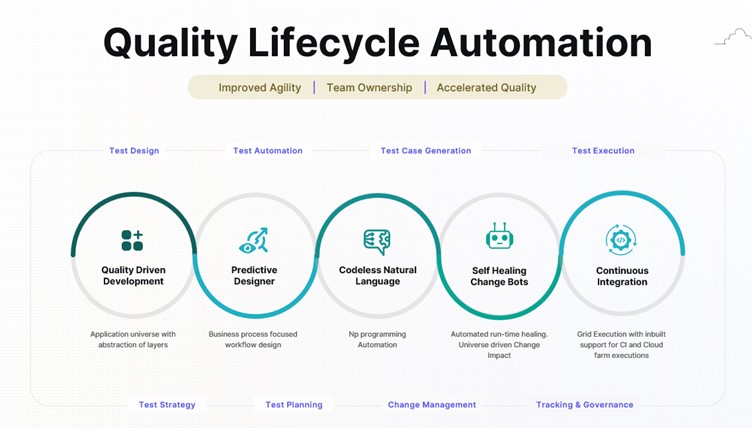
Thanks to ACCELQ for providing us with this blog post.
Did you know? There are 5.48 billion unique mobile phone users across the globe. That’s almost 68.6% of the world’s population. No doubt, mobile app testing is soaring in popularity.
Mobile App Testing Is the Need of the Hour

About 59.72% of web traffic today comes from mobile phones. Imagine the quality and performance levels today’s teams must meet to cater to this web traffic. A top priority for teams is ensuring each mobile user has a seamless, secure, and satisfying experience every time they pick up the phone.
Crafting and maintaining this top-notch user experience demands rigorous and continuous testing. The right approach to mobile app testing can bring several benefits to the table. It can:
- Improve user experience and boost retention rates
- Reduce the frequency and complexity of bugs
- Bring much-needed stability into mobile apps
- Test if new features, changes, and enhancements are working properly
- Boost user ratings and downloads and improve public perception
But Traditional Approaches to Mobile App Testing Are No Longer Scalable
Device fragmentation is at an all-time high. Testing the rich diversity of browsers, devices, and platform versions would require hiring an army of testers. Add to it the unique characteristics of different types of educational, lifestyle, social media, productivity, and gaming apps and the way they are built. For example:
- Native apps are developed specifically for a single mobile platform such as iOS or Android. Built using the platform’s native programming language and development tool, they are typically faster and more responsive than other types of apps. Since they take advantage of device-specific features such as sensors and Bluetooth, they provide a more interactive UI/UX and have lesser compatibility issues.
- Web apps are generally developed for mobile devices and accessed via any internet browser on a mobile device. They do not need any storage space and are constantly updated. They dramatically reduce the business costs associated with development and maintenance. They are responsive websites that adapt the user interface to the user’s device.
- Hybrid apps are developed using web technologies such as HTML and CSS and wrapped in a native container that allows them to run on multiple platforms. Typically, they are easier and faster to develop than native apps but may not be as fast or responsive. However, hybrid apps are ideal in situations where high performance and full device access are not key requirements.

Mobile app testing isn’t just about writing a handful of test cases and running a few tests. Several challenges make testing a nightmare.
Setup
As depicted below, you must first feed your test script to a Selenium tool. Selenium then sends automation commands to an Appium Server, which logs results in a console. The Server also invokes vendor-specific configuration to execute commands via a simulator and an emulator.

Functional
When it comes to functional testing, several aspects of the mobile app have to be continuously and carefully tested — from web views to mouse actions, maps to images.

Miscellaneous
Mobile apps must also be continuously tested for interruptions. Evaluating how the app behaves during low battery, when a notification pops up, or when a call is received is equally important. In addition, it pays to test:
- User experience during installation/uninstallation
- UI with all forms of gesture navigation
- When users don’t have permissions
- When the network is not available
- If your app updates correctly from previous versions
Building and maintaining a QA lab is extremely difficult, with varying mobile architectures, app security requirements, and feature demands. Since every mobile app must be tested for functionality, compatibility, usability, performance, security, and localization, it is critical to automate the testing process. Taking the mobile test automation route can open doors to several time, cost, and efficiency benefits.
Investing in the Right Test Automation Framework Is Key
A modern test automation framework can simultaneously test apps on multiple platforms and quicken the feedback cycle. It can maximize test coverage, enable 24/7 text execution, and allow reusability of test cases. It can also pave the way for seamless scalability – regardless of how big the app grows or how large the user base becomes.
But with so many frameworks available in the market today, how do you make the right choice?
- How do you ensure the framework keeps up with the pace of app changes?
- How do you efficiently simulate real-world user scenarios?
- How do you ensure integration with backend systems?
- How do you handle different types of apps and different types of mobile platforms?
- How do you ensure continuous testing?
How To Choose the Right Mobile Test Automation Framework
If you want to transform your testing results, here are some things to keep in mind:
- Identify your testing requirements
- Evaluate different solutions
- Consider ease of use and the overall learning curve
- Look for a solution that is easy to maintain and scale and is extensible
- Look for a solution that supports different app types and mobile platforms
- Invest in a Unified Test Automation platform
- Evaluate the tool’s DevOps – CI/CD integration capabilities
- Assess reporting and analytics capabilities
- Consider support features and evaluate community support
- Take into consideration the cost and feasibility
How ACCELQ Handles Mobile Test Automation
As an intelligent, cloud-based mobile test automation platform, ACCELQ enables seamless multi-channel automation across the mobile tech stack. The tool takes a revolutionary approach to business assurance in a multi-packaged app environment. It allows for codeless mobile test automation that handles real-world complexities and presents a unified view of the quality lifecycle.

ACCELQ is a market leader in test automation and test management. Its automation flow recorder is coupled with a powerful Natural Language no-code editor. It can execute test automation across different mobile OSs and is agnostic of development frameworks. In addition, the tool’s design-first approach with inbuilt modularity means there is no need for custom frameworks.

- Codeless: ACCELQ’s codeless capabilities allow teams to write and run test cases with zero setup and no coding. It enables testers to automate without the need for programming skills.
- AI-powered: Being a true no-code mobile test automation platform, ACCELQ’s AI-powered capabilities automate and execute tests across different OSs and devices. The tool’s advanced mobile object handling capabilities eliminate test flakiness.
- Lifecycle automation: ACCELQ allows for mobile test automation across the lifecycle of mobile apps. Using ACCELQ, teams can easily set up, design, develop, execute, and track mobile test automation.
- Unified flow: ACCELQ offers full-blown version control, branching, and merging capabilities, all in one unified collaborative cloud platform. Teams can use ACCELQ to enable mobile, web, API, backend, and full-stack automation in the same unified flow.
- Cross-device: ACCELQ’s Integrated Device Cloud Labs allow for seamless cross-device testing using a simple Plug & Play model.
- High coverage: ACCELQ’s app universe and analytic-based algorithms drive automated test planning, ensuring coverage.
- Actionable reports: ACCELQ offers dynamic live results views with actionable reports to trigger reruns. Email notifications that fit into the process allow for quick and effective decision-making.
- Seamless support: The tool offers seamless support across popular mobile dev frameworks, including Android, iOS, React, Ionic, and Apache Cordova.
- Robust and sustainable: The ACCELQ platform is robust and sustainable and offers automation capabilities that are significantly low on maintenance.
- Self-healing: The tool’s self-healing element identification drastically enhances the quality and reliability of tests.
- Low maintenance: Referential integrity across test assets hugely reduces maintenance and upkeep.
The Way Forward
If you want to meet the expectations of the constantly growing mobile user base, it’s time to take mobile testing more seriously. Embark on the mobile test automation journey today to make your tests more reliable and predictable and your apps more functional and secure.
Author

Nishan Joseph, VP-Sales Engineering,
ACCELQ
Nishan is a highly accomplished and dynamic leader who has been working in the technology space for over a decade. He is known for his ability to build strong partnerships with long-term strategic goals. Nishan leads the Sales Engineering division, while also overseeing some of the larger global Strategic Accounts for the company.
ACCELQ is an EXPO Exhibitor at EuroSTAR 2023, join us in Antwerp.